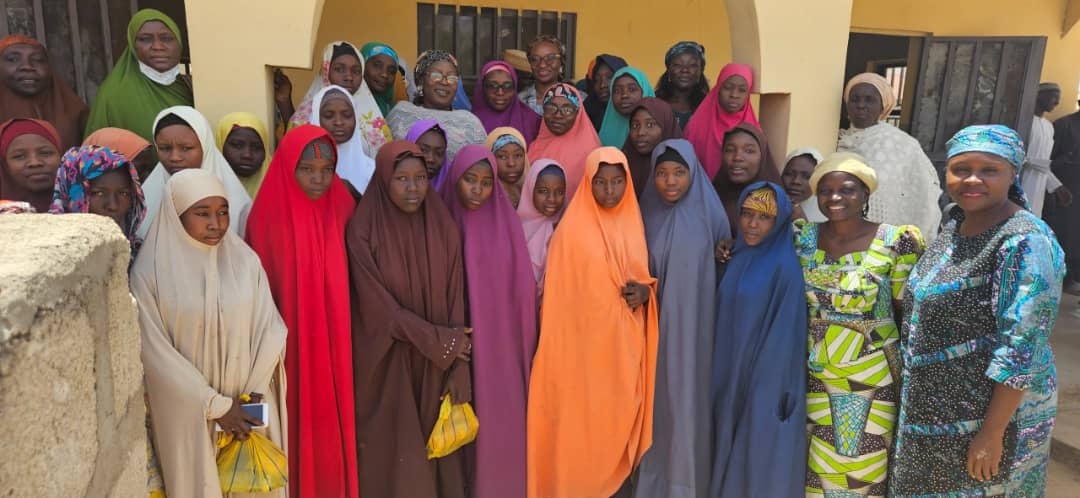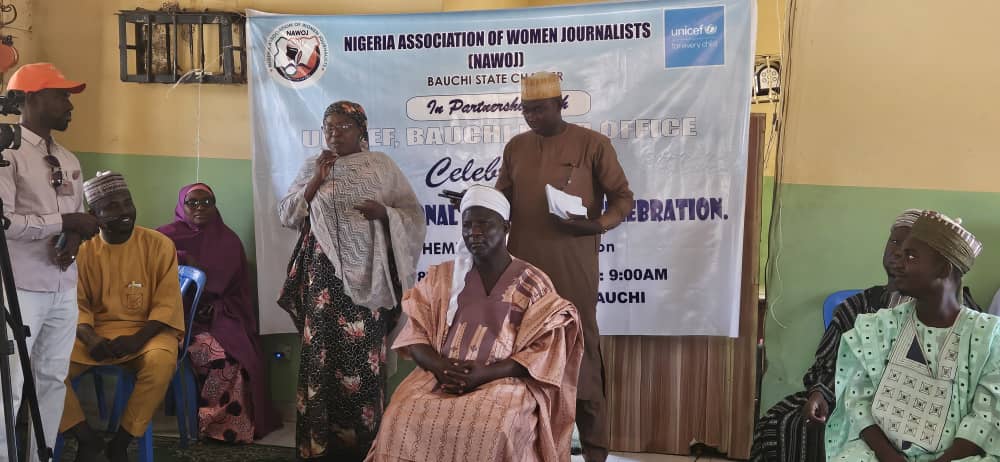By Beatrice Gondy
Recently, in the quiet village tucked within Bauchi Local Government, young girls gathered and sat in anticipation. Their eyes, filled with curiosity, reflecting both excitement and relief. They had come not for a celebration, not for a festival, but for something just as important – knowledge.
For far too long, menstruation had been shrouded in silence, whispered about in hushed tones, and treated as a taboo. But on this day, at the Palace of the Village Head of Tirwun, that silence was broken. The Nigeria Association of Women Journalists (NAWOJ), Bauchi State Chapter, in partnership with the Bauchi Field Office of UNICEF, had come to rewrite the narrative. The mission was simple: to empower adolescent girls with the knowledge and confidence to manage their menstrual health with dignity and pride.

“Menstruation should be celebrated. It is not a taboo; it is a natural phenomenon,” said Rashida Yusuf, the NAWOJ Chairperson. She stood before the girls, many of whom had never had a formal conversation about their own bodies.
For these young girls, menstruation had always been something to hide, something to be ashamed of. But here, within the walls of the village head’s palace, they were learning that their bodies were not a source of embarrassment but a source of power.

“When girls understand how to manage their periods hygienically and confidently, they gain a sense of empowerment that goes beyond their physical well-being,” Rashida told her listeners.
She spoke about the challenges girls face in school—stained uniforms, lack of sanitary products, the fear of being mocked. She stressed that access to menstrual hygiene products is not a luxury but a necessity, one that ensures the dignity, health, and well-being of every girl.
Then came the lessons—practical, life-changing, and liberating. Murjanatu Mohammed, a health expert, took the floor. With warmth and patience, she walked the girls through the importance of menstrual hygiene.
“Being clean is not just about appearances. It’s about health, about confidence,” she told them. She encouraged them to adopt the use of reusable sanitary pads, a cost-effective alternative to the expensive disposable ones that many families could not afford.
And then, something extraordinary happened. Hauwa Mohammed, another health worker, began a demonstration. She showed the girls how to make reusable sanitary pads with materials they could find at home. The room buzzed with excitement as they watched, fascinated by the idea that they could take control of their own hygiene in a way that was sustainable and affordable.
“This is not just about saving money,” Hauwa said, looking at the girls. “This is about independence. This is about knowing that you don’t have to depend on anyone else to take care of your own body.”
Watching from the sidelines was Alhaji Ahmad Muhammad Tirwun, the Village Head. He listened intently, nodding as the girls learned and laughed. When it was his turn to speak, he did so with pride.
“This is knowledge that will stay with them forever. I am grateful that NAWOJ chose our village for this training,” he said. “My palace will always be open for such programs because information is power, and power must be shared”, he assured the organisers.
A New Chapter for Tirwun Girls
Among the participants was 18-year-old Maryam Adamu, her eyes shining with gratitude. She had never attended a session like this before.
“I have always struggled with managing my periods. No one ever really explained it to me,” she admitted. “Now, I feel like I finally understand my body. I will share everything I’ve learned today with my sisters and friends.”
It was a one-day training, a small moment in time. But for these girls, it was a new beginning. They left not just with knowledge but with confidence, dignity, and a sense of belonging.
NAWOJ’s initiative was not just about menstrual hygiene—it was about empowerment, breaking stigmas, and ensuring that every girl in Bauchi knows that her body is nothing to be ashamed of, but something to be celebrated.









































Discussion about this post